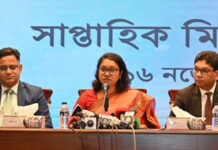Noted watchdog Reporters Sans Frontières has placed Bangladesh 144th among 180 countries in its latest Press Freedom Index, placing the country in even lower ranking than war-torn South Sudan, Afghanistan and authoritarian Zimbabwe.
The short brief about Bangladeshi press’ performance also notes that “the media is fairly outspoken on less sensitive issues.” Bangladesh has scored 45.94.
However, on a brighter note, Bangladesh actually moved two steps ahead from its previous ranking of 146. But it was far lower than its highest ever ranking of 118 in 2002, the first year the global index was published. Bangladesh’s lowest ever ranking was 151 in both 2005 and 2004.
The global advocacy group observes that Bangladeshi journalists and bloggers risk life imprisonment or death penalty if they fail to censor themselves from criticising the constitution and the state religion.
The World Press Freedom Index considers a range of criteria in preparing the ranking that include media pluralism and independence, respect for the safety and freedom of journalists, and the legislative, institutional and infrastructural environment in which the media operates.
Nepal topped the list among South Asian nations at 105th place with a score of 32.62. It was followed by Afghanistan at 120th with a score of 37.75, India (133rd), Sri Lanka (141st), and Myanmar (143rd). Pakistan ranked 147th with 48.52 points.
Globally, the Paris-based advocacy group warns of a climate of fear that has seen world leaders “developing a form of paranoia about legitimate journalism.” It also says press freedom deteriorated last year, especially in the Americas.
The World Press Freedom Index ranks 180 countries on indicators such as media independence, self-censorship, the rule of law, transparency and abuses.
The situation was particularly grave in Latin America, the report says, highlighting “institutional violence” in Venezuela and Ecuador, organised crime in Honduras, impunity in Colombia, corruption in Brazil and media concentration in Argentina as the main obstacles to press freedom.
Among the lowest ranked countries are Syria, at 177th place, just below China (176th) but above North Korea (179th) and last placed Eritrea.
Japan has slumped to 72nd due to what the watchdog identifies as self-censorship towards Prime Minister Shinzo Abe, while Finland retains its top spot for the sixth consecutive year, followed by the Netherlands and Norway.
However, in Europe threats to journalists were linked to rising nationalism which saw death threats in Sweden, which has dropped three places to 8th, and attacks on journalists during anti-Muslim rallies in Germany (which has dropped four spots to 16).
Published annually by RSF since 2002, the World Press Freedom Index is an important advocacy tool based on the principle of emulation between states. Because it is now so well known, its influence over the media, governments and international organizations is growing.
The Index is based on an evaluation of media freedom that measures pluralism, media independence, the quality of the legal framework and the safety of journalists in 180 countries. It is compiled by means of a questionnaire in 20 languages that is completed by experts all over the world. This qualitative analysis is combined with quantitative data on abuses and acts of violence against journalists during the period evaluated.
– See more at: http://www.dhakatribune.com/bangladesh-media/2016/apr/20/bangladesh-144th-world-press-freedom-index#sthash.vjjussJt.dpuf
Source: Dhaka Tribune










